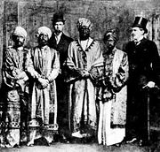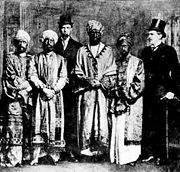
Dreadnought hoax
Encyclopedia

Practical joke
A practical joke is a mischievous trick played on someone, typically causing the victim to experience embarrassment, indignity, or discomfort. Practical jokes differ from confidence tricks in that the victim finds out, or is let in on the joke, rather than being fooled into handing over money or...
pulled by Horace de Vere Cole
Horace de Vere Cole
William Horace de Vere Cole was a British eccentric prankster and poet...
in 1910. Cole tricked the Royal Navy
Royal Navy
The Royal Navy is the naval warfare service branch of the British Armed Forces. Founded in the 16th century, it is the oldest service branch and is known as the Senior Service...
into showing their flagship
Flagship
A flagship is a vessel used by the commanding officer of a group of naval ships, reflecting the custom of its commander, characteristically a flag officer, flying a distinguishing flag...
, the warship HMS Dreadnought
HMS Dreadnought (1906)
HMS Dreadnought was a battleship of the British Royal Navy that revolutionised naval power. Her entry into service in 1906 represented such a marked advance in naval technology that her name came to be associated with an entire generation of battleships, the "dreadnoughts", as well as the class of...
to a supposed delegation of Abyssinian
Ethiopia
Ethiopia , officially known as the Federal Democratic Republic of Ethiopia, is a country located in the Horn of Africa. It is the second-most populous nation in Africa, with over 82 million inhabitants, and the tenth-largest by area, occupying 1,100,000 km2...
royals. The hoax drew attention in Britain to the emergence of the Bloomsbury Group
Bloomsbury Group
The Bloomsbury Group or Bloomsbury Set was a group of writers, intellectuals, philosophers and artists who held informal discussions in Bloomsbury throughout the 20th century. This English collective of friends and relatives lived, worked or studied near Bloomsbury in London during the first half...
.
Chronology
The hoaxHoax
A hoax is a deliberately fabricated falsehood made to masquerade as truth. It is distinguishable from errors in observation or judgment, or rumors, urban legends, pseudosciences or April Fools' Day events that are passed along in good faith by believers or as jokes.-Definition:The British...
involved Cole and five friends—writer Virginia Stephen (later Virginia Woolf
Virginia Woolf
Adeline Virginia Woolf was an English author, essayist, publisher, and writer of short stories, regarded as one of the foremost modernist literary figures of the twentieth century....
), her brother Adrian Stephen
Adrian Stephen
Adrian Stephen was a member of the Bloomsbury Group, an author and psychoanalyst, and the brother of Virginia Woolf and Vanessa Bell...
, Guy Ridley, Anthony Buxton and artist Duncan Grant
Duncan Grant
Duncan James Corrowr Grant was a British painter and designer of textiles, potterty and theatre sets and costumes...
—who disguised themselves with skin darkeners and turbans. The disguise's main limitation was that the "royals" could not eat anything or their make-up would be ruined. Adrian Stephen took the role of "interpreter".
On 7 February 1910 the hoax was set in motion. Cole organised for an accomplice to send a telegram to HMS Dreadnought which was then moored in Portland, Dorset
Isle of Portland
The Isle of Portland is a limestone tied island, long by wide, in the English Channel. Portland is south of the resort of Weymouth, forming the southernmost point of the county of Dorset, England. A tombolo over which runs the A354 road connects it to Chesil Beach and the mainland. Portland and...
. The message said that the ship must be prepared for the visit of a group of princes from Abyssinia and was purportedly signed by Foreign Office Under-secretary Sir Charles Hardinge
Charles Hardinge, 1st Baron Hardinge of Penshurst
Charles Hardinge, 1st Baron Hardinge of Penshurst, was a British diplomat and statesman who served as Viceroy of India from 1910 to 1916.-Background and education:...
.
Cole with his entourage went to London
London
London is the capital city of :England and the :United Kingdom, the largest metropolitan area in the United Kingdom, and the largest urban zone in the European Union by most measures. Located on the River Thames, London has been a major settlement for two millennia, its history going back to its...
's Paddington station
Paddington station
Paddington railway station, also known as London Paddington, is a central London railway terminus and London Underground complex.The site is a historic one, having served as the London terminus of the Great Western Railway and its successors since 1838. Much of the current mainline station dates...
where Cole claimed that he was "Herbert Cholmondeley" of the UK Foreign Office and demanded a special train to Weymouth; the stationmaster arranged a VIP coach.
In Weymouth, the navy welcomed the princes with an honour guard. An Abyssinian flag was not found, so the navy proceeded to use that of Zanzibar
Zanzibar
Zanzibar ,Persian: زنگبار, from suffix bār: "coast" and Zangi: "bruin" ; is a semi-autonomous part of Tanzania, in East Africa. It comprises the Zanzibar Archipelago in the Indian Ocean, off the coast of the mainland, and consists of numerous small islands and two large ones: Unguja , and Pemba...
and to play Zanzibar's national anthem
National anthem
A national anthem is a generally patriotic musical composition that evokes and eulogizes the history, traditions and struggles of its people, recognized either by a nation's government as the official national song, or by convention through use by the people.- History :Anthems rose to prominence...
.
The group inspected the fleet. To show their appreciation, they communicated in a gibberish of words drawn from Latin and Greek; they asked for prayer mats and attempted to bestow fake military honours on some of the officers. An officer familiar with both Cole and Virginia Stephen failed to recognise either.
When the prank was uncovered in London, the ringleader Horace de Vere Cole
Horace de Vere Cole
William Horace de Vere Cole was a British eccentric prankster and poet...
contacted the press and sent a photo of the "princes" to the Daily Mirror. The group's pacifist views were considered a source of embarrassment, and the Royal Navy briefly became an object of ridicule. The Navy later demanded that Cole be arrested. However, Cole and his compatriots had not broken any law
Law
Law is a system of rules and guidelines which are enforced through social institutions to govern behavior, wherever possible. It shapes politics, economics and society in numerous ways and serves as a social mediator of relations between people. Contract law regulates everything from buying a bus...
. The Navy sent two officers to cane
Caning
Caning is a form of corporal punishment consisting of a number of hits with a single cane usually made of rattan, generally applied to the offender's bare or clothed buttocks or hand . Application of a cane to the knuckles or the shoulders has been much less common...
Cole as a punishment but Cole countered that it was they who should be caned because they had been fooled in the first place.
Aftermath
During the visit to Dreadnought, the visitors had repeatedly shown amazement or appreciation by exclaiming, "Bunga! Bunga!"Bunga bunga
Bunga bunga is a phrase of uncertain meaning that dates from 1910 if not earlier. By 2010 the phrase had gained popularity in Italy and the international press as well, when it was used by the Italian Prime Minister Silvio Berlusconi to refer to his alleged sex parties, which caused a major...
When the real Emperor of Ethiopia, Menelik II, visited England some time later, he was chased by children shouting "Bunga! Bunga!". Ironically, the Emperor afterward requested to view the Navy's facilities, but the senior Admiralty officer in charge declined to grant his request—possibly to avoid further embarrassments.
In 1915 during the First World War, HMS Dreadnought rammed and sank a German submarine. Among the telegrams of congratulation was one that read "BUNGA BUNGA".

